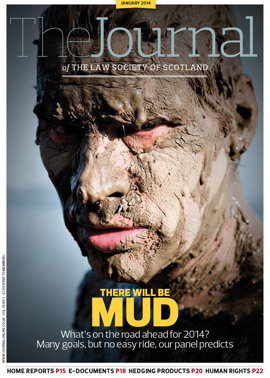President's column
Although it may now seem a distant memory, I hope the festive holiday allowed all of you and your families to enjoy a well-earned break and prepare for an eventful year ahead. So what’s in store?
Legal aid and access to justice are again likely to prove key issues in 2014 and, of course, the independence referendum will never be far from anyone’s thoughts as we consider the biggest constitutional shakeup in 300 years.
The biggest talking point during discussions with colleagues is often the economic environment. Naturally, anxieties remain – smaller firms in particular face a squeeze on turnover and profitability. I believe that innovative thinking, for which we as a profession are long recognised, along with acute management and business skills and adoption of the right technology, will be needed. Overall, I do detect a growing optimism.
Decisions taken over recent months – cutbacks, closures, mergers, acquisitions, start-ups – have significantly changed the legal marketplace. Just last month, Dundas & Wilson announced a merger with London-based CMS. While it is sad to see one of our biggest and most successful firms merge, it does so with a very good firm and will continue (as a business and as individual members) to be important to us. All businesses need to make the decisions that are right for them, and no one should doubt that the trend of amalgamation is likely to continue.
A huge effort has already gone into developing a scheme that would allow us to regulate new licensed legal services providers, and this work remains a priority. Every possible tool must be available to members as they face challenges and prepare positively for the upturn. Our intention is to finalise the detailed draft scheme and submit it to the Scottish Government shortly, hopefully allowing an early decision to be made.
Justice issues
Legal aid and access to justice issues attracted considerable attention in 2013, and will do so again this year. The process of closing court buildings across Scotland has begun; the next phase, scheduled for May, involves significantly bigger courts and work transferring to already busy locations, including Aberdeen and Dundee. The Society will monitor the impacts on capacity and performance, and ensure the views of members and their clients are heard.
I was pleased to see the Government announce a delay in the implementation of criminal legal aid contributions, to allow issues of non-payment to be fully explored. We have made clear to the Government and Scottish Legal Aid Board since 2012 that there would be practical problems, including professional practice issues, if central collection was not introduced. The Society has developed guidance for members on when to withdraw from acting because of non-payment, to provide them with certainty and security as they adapt. It is encouraging to see proper account at last being taken of concerns about the collection system. I hope we can achieve an effective contributions scheme that protects the interests of clients and is fair to solicitors, whose involvement and expertise are essential in making the justice system work.
Likewise, we have maintained close contact with colleagues over contracting in criminal legal aid, and have published detailed research on other jurisdictions. While I continue to believe that the case has yet to be made for contracting, I am hopeful that the Government’s consultation on the issue, originally expected last year, will allow us properly to assess any proposed models. The Society will survey members later this year to ensure their views are accurately reflected.
Answers please
The Society is determined to play its part in the independence debate. Following publication of our well-received discussion paper on Scotland’s constitutional future (an update will be released in spring), we commissioned MORI to poll the public for their attitudes towards the campaign so far, at the end of November. Despite this being an exciting and possibly pivotal time, the survey, worryingly, found that many Scots still do not feel properly informed.
Over half said the debate was not covering the issues they care about, and two thirds found it difficult to decide whether or not the information they are getting is true. The responsibility to ensure the right questions are being asked and answered on both sides lies, in addition to politicians and campaigns, with a wide range of organisations, including, of course, the Society. As with the many important issues ahead, much work needs done and I am excited about contributing to our programme of events and activity in the coming months.
Before closing, I would like to congratulate Alistair Morris and Christine McLintock on being elected President and Vice President, respectively, for 2014-15. I am certain both will prove outstanding representatives of the Scottish solicitors’ profession and the public we serve, and I very much look forward to working with them.
I wish all of you a healthy, happy and prosperous 2014.
In this issue
- The DCFR, anyone?
- Cloak and dagger in cyberspace?
- One person's entertainment
- Scouting for professionals?
- Reading for pleasure
- Opinion column: Alan McIntosh
- Book reviews
- Profile
- President's column
- Working smarter, working harder
- Hang tough
- At home with home reports?
- E-missives: what now?
- Hedges: a financial plague
- Rights: a bold agenda
- Timetable twist
- Overprovision: what next?
- Sustainability is the key
- LLP rules unveiled
- Relocation: locking the stable door
- Scottish Solicitors' Discipline Tribunal
- Island futures
- An onerous obligation?
- What's in a name?
- How not to win business: a guide for professionals
- Merging: a safe partner?
- Ask Ash
- From the Brussels office
- Law reform roundup






